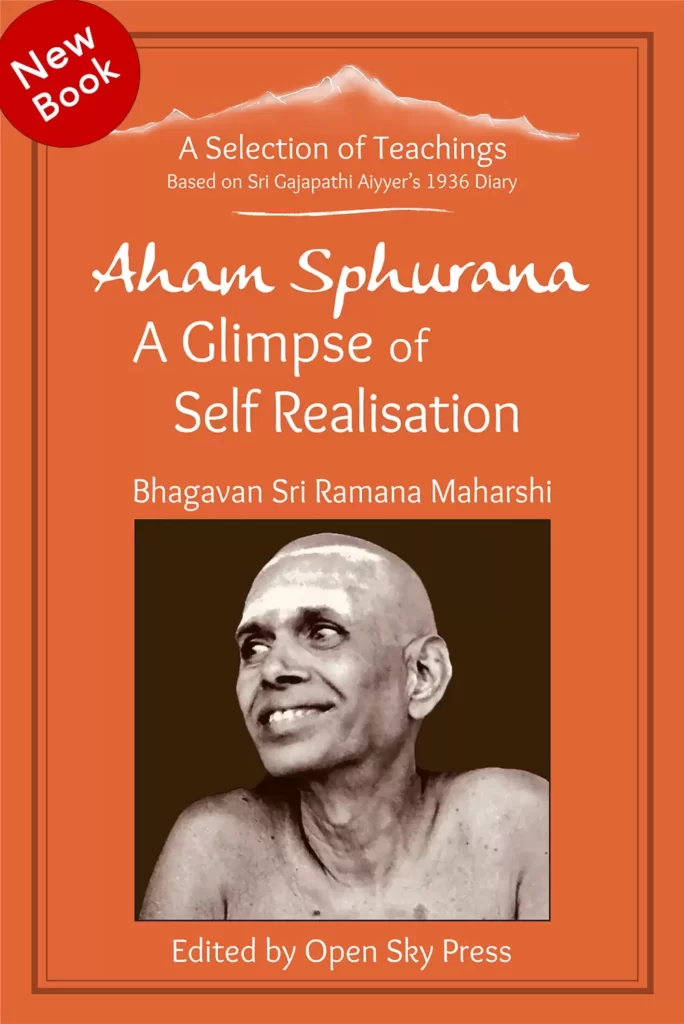
Aham Sphurana
A Glimpse of Self Realisation
New Book about Sri Ramana Maharshi

Available Worldwide
On www.openskypress.com and Amazon:

“In my opinion, Aham Sphurana, a Glimpse of Self Realisation, will become a Treasure Trove of Wisdom to the Seekers of Truth in general, and particularly to the devotees of Bhagavan.”
Swami Hamsananda – Athithi Ashram, Tiruvannamalai
Mind and Jesus Teachings
“15th July, 1936 – SS Cohen has returned!
Q.: I have heard Bhagawan saying “Knowledge of the world is exclusively knowledge of the knower of the world.” What does it mean?
B.: That the world is only in the mind–that the appearance of any world, or the phenomenon of manifestation, is not possible in isolation from your mind.
Q.: Are there as many minds in the world as there are people? Are all these minds emanating from the Self at the same time?
B.: There are not multiple minds. Only your mind emerges from the Self, styles itself “I”, makes the assumption that the objects it perceives through the senses are apart from it and have an objective existence independent of its perception of them, generates desires towards those objects, feels frustrated when those desires are thwarted from being fulfilled, asks questions about the meaning and purpose of life, and finally raises as respects itself the doubt “Who am I?”, as a result of which it subsides quietly back into the Self. The entirety of this cycle is happening only from the point of view of the mind. The Self is not aware of any change. Since all perception [sensory or intellectual] is perception only of what does not exist, and since the idea of “other minds” is only an inference that forms the subject matter of a mental perception, there are no other minds. Yours is the only mind that appears to be, and if you go on closely and intensely investigating it for a prolonged and unintermittent period of time, that will also vanish, leaving behind only the substratum that always was.
Q.: How can that be? Just as I have a mind, so too must the others in this Hall–except Bhagawan, of course, who has successfully eradicated it.
B.: The scene appearing in front of your eyes is a fabrication of your own mind only.
Q.: Is there any proof for this?
B.: The world and mind arise and set together as one. Consider the state of sushupti. Did multiplicity exist for you then?
Q.: The universe may exist in sleep but go unperceived.
B.: The perceiver is the only creator and the one exclusive cause for manifestation–and in his absence there is nothing but Bliss.
Q.: I understand this line of reasoning. But again I ask–how can it be proven?
B.: The entity hankering after proof is the mind. Can mind discover proof of its own non-existence? No. You can never find mind through mind. Surrender it and you will be absorbed into the Beyond. The entity competent to ascertain or pass judgement on the question of the mind’s existence—and therefore the question of the existence of manifestation—cannot be the mind itself. Mind can know only mind, whereas in the state of no-mind there is a clear [unambigious] absence of mind.
Q.: Who recognises the absence of mind in the state of no-mind?
B.: Since there is no mind to carry out any recognition or to be subject to it, the question of the recognition or non-recognition of the existence or non-existence of mind never arises in the state of no-mind. The suggestion of the fact that the mind is a perishable entity gives rise to a mental curiosity to discover the substratum that is left, if any and whatever it might be, after the mind has been destroyed. This curiosity, known as Aathmajigyasa, causes the mind to become introverted and thus brings about Realisation.
Q.: Do all jivas have this curiosity?
B.: No.
Q.: How to get it?
B.: By the Grace of the Guru.
Q.: And how is that obtained?
B.: If you go on working with the light available, you will meet your Guru, as he will himself be seeking you.
Q.: I have some doubts about what I have read in the Bible, in particular concerning the actions and sayings of Jesus. May I clarify them with Sri Bhagawan, whom I consider to be a living embodiment of the Christ Himself?
B. indicated his assent with a patient nod of his head.
Q.: What does “Ego eimi” mean, coming from the mouth of Jesus?
B.: Among all the names of God, the one that most efficaciously captures the essence of the only non-circumlocutious [direct] means to Realise Him is the name “ehyeh asher ehyeh”, which is revealed to Moses from the burning bush. Unto those who know the significance of the name is revealed the means of Realisation, because they are one and the same: “Because he hath set his love upon me, therefore will I deliver him: I will set him on high, because he hath known my name.” Jesus is reassuring his followers, and indeed anybody willing to listen, that Emancipation is obtained not by good works but by God’s Grace alone, and that such Grace does not come arbitrarily but to those who have heard God’s name and understood its significance. The significance is that complete introversion is the direction that the mind needs to be channelised or yoked into, so as to make Realisation possible. “I-am that I-am” implies that the mind is not aware of anything other than itself–it is the state of samadhi.
“I am this or that…” is jagrat-swapna, where the mind is occupied with name and form, memory and belief, otherness and separation. “I-am” is the Noumenon that is the substratum from which the mind derives its existence and into which it resolves. “I-am” is a reference to a state in which there cannot be any externality. This is the state that prevails prior to and underneath the mind. In asseverating “I-am”, Jesus is not deliberately blaspheming the Jewish belief system corresponding to the period of Herod’s Temple; he is indicating that his state transcends time and space: “Before Abraham was, I am”. The purpose, inasmuch as there can any such thing be attributed to the deeds of one whose mind is dead, of speaking those words is to proclaim that the state in which concepts of time and space have been given up is verily the one and only state that is worthy of being the object of our effort to cultivate. “I-am”—here lending itself to the interpretation of being the state of mind that does not see or recognise anything external to itself—is the way, the truth, and the life.
Q.: What did Jesus mean when He said, “Unto you it is given to know the mystery of the kingdom of God: but unto them that are without, all these things are done in parables: that seeing they may see, and not perceive; and hearing they may hear, and not understand; lest at any time they should be converted, and their sins should be forgiven them.”? Surely He did not mean that people should suffer for not being able to understand His words?
B.: Many people arrive at Ramanasramam, pick up the Pamphlet Who am I?, come here, prostrate before the Sofa, ask me for benediction and go away. Do all of them attain Jnana?
Q.: Meaning it is necessary to continuously remain in the physical presence of Sri Bhagawan for years at a time, to stand a genuine chance of Realising?
B.: The mental presence is what counts.
Q.: I do not understand.
B.: Sri Ramakrishna has said–“Complete guilelessness is necessary to Realize God.”. One man may keep on doing tapas all the hours of day and night, but if he has not freed himself from the idea “I am doing tapas.”, he is not going to reap any spiritual benefit. Another may remain in the thick of the world attending to various tasks that constitute the prarabdha of his body to attend to, without thinking that he is doing anything, having surrendered mind and body, heart and soul, to God. To such a one Realisation comes effortlessly. What Jesus means is not that He is delibrately trying to keep anyone in the dark about His teachings, but that to those whose ego has not subsided, His teachings would be incomprehensible. It [the passage] means that one who still arrgantly thinks “I”, even after being told to surrender, deserves no mercy and that he will certainly find the path to Realisation closed to him.
Q.: Where has Jesus advocated self-surrender?
In response to this question, Sri Bhagawan illumined the Hall with his own Advaitic Sermon on the Mount. One quote from Jesus would be read out by B. from the Bible. Then he would explain its advaitic interpretation. I have captured the flow in the form of a number of paragraphs, reproduced hereasunder; verse numbers have not been quoted because this is an enormously famous passage from the Bible, and I do not want to waste space in the manuscript:
Bible verse containing words of Jesus:
“Blessed are the poor in spirit: for theirs is the kingdom of heaven.”
Bhagawan’s interpretation of the above Bible verse:
Those whose individual volition is on the wane are on their way to the kingdom of heaven, which is not some distant physical realm but only the formless Self that stands revealed as the one’s true “I” after the Guru’s glorious look of grace has mercilessly massacred the evil citadel of egotism, which claims that it is “I”. Poverty in spirit refers to meekness, a state in which the ego’s feeling that it is capable of establishing and governing its own destiny has been totally crushed. Profligacy in spirit [—that is to say, a rambunctious ego—] makes a man identify himself as being the owner and controller of the instruments of sense perception, and makes his sense of attachment with the body and the multitudinous objects that appear to him in the jagrat-swapna states to go on engorging; but in the man who has meekly given up the ego, there is unwillingness to accept the idea as true that the body is the self. The one who has given up the body-am-I idea does not feel that he is the doer of the actions of the body. He does not feel inclined to take delight in, or be subject to anguish as a result of, the body’s actions; he does not feel the slightest need to celebrate or justify the actions of the body, be they good or bad, but has expunged from his mind the faculty of preferring one course of events over the other. Whatever the course of events might be that are taking place in relation to his body and the world, they do not produce any mental impact on him. When facing censure or praise for their actions or abstentions, those drawn towards the path of bhakti should assure themselves that God alone is acting and that the body is a malleable tool in His hands. Humility and deference come naturally to one who has unequivocally surrendered the responsibility for his life to God. Since God’s Own [Holy] Spirit has taken up responsibility for such a man and his actions, since his own desires, ambitions, and aspirations have been abandoned at God’s altar in an attitude of irremediable self-surrender, and since his love of God is so extreme that he has forsaken his personality once and for all and given himself up into God’s hands completely, he is called poor in spirit, for his own ego does not count anymore and he has nothing called his personal-self. Such a one would certainly inherit the Heavenly Kingdom–that is to say, attain Self-Realisation.
Bible verse containing words of Jesus:
“Blessed are the pure in heart: for they shall see God.”
Bhagawan’s interpretation of the above Bible verse:
The mind divested of vrittis is said to have freed itself from all impurities. Vasanas cling to the Heart tightly, not allowing it to shine. When by the sadhaka’s incessant heroic effort, made possible on account of God’s grace, the vasanas are destroyed completely, the Heart is no longer sheathed in impurities, and shines as God himself. Then the ego sees it was never parted from its beloved, God, but was always One with Him. Thus the pure Heart sees itself to be not different from God. To be supremely unconcerned in all matters, with the mind cool, desireless and without hatred, is the only appropriate behaviour for a sadhaka.
Bible verse containing words of Jesus:
“For verily I say unto you, Till heaven and earth pass, one jot or one tittle shall in no wise pass from the law, till all be fulfilled.
Bhagawan’s interpretation of the above Bible verse:
For one who is drowning in the venomous ocean of more and more action that in turn begets more and more action, and craves rest and peace, surrender is the proper remedy. Action cannot bring about freedom from action. Further doing is not the remedy by which the effects of previous doing may be ameliorated. All action performed will definitely cause bondage so long as the idea I-am-the-doer remains in the mind. Action performed with kartritvabuddhi plants the seeds for more similar action to be performed in the future, casting one into an ocean of karma. The actorless action alone is appropriate.
Bible verse containing words of Jesus:
“One jot or one tittle shall in no wise pass from the law till all be fulfilled.”
Bhagawan’s interpretation of the above Bible verse:
Means action that is spurred by personal doership will definitely bring on more actions in its wake. This statement from Jesus is a testimony to the fact that the doctrine of karma, which states that actions beget more actions, is quite infallible and without exception. The only way to free oneself is to surrender unreservedly.
Bible verse containing words of Jesus:
… “if thou bring thy gift to the altar, and there rememberest that thy brother hath ought against thee; leave there thy gift before the altar, and go thy way; first be reconciled to thy brother, and then come and offer thy gift.”
Bhagawan’s interpretation of the above Bible verse:
Do not try to surrender to God while the petty desire for revenge still rankles in your mind, thinking, “I shall surrender, bring God over to my side and then gleefully watch God punish my foe!” Only that surrender is valid which is completely bereft of motive. If any motive for surrendering is still left in you, including desire for or anticipation of Emancipation or Self-Realisation, cleanse the mind of those motives, and then surrender, for God or the Heart will deign to accept only that surrender which is totally motiveless.
Bible verse containing words of Jesus:
“Neither shalt thou swear by thy head, because thou canst not make one hair white or black.”
Bhagawan’s interpretation of the above Bible verse:
Man makes vain calculations about his own talents and abilities; when circumstances do not follow in line with his plans, he becomes dejected and despondent and blames God for his foolish mishaps. Man faces these problems because he sets store by his own capabilities and calls out for God’s assistance only when matters go out of hand. “Do not swear by thy head.” means “Do not place faith in your prowesses, but instead depend on God, for this is sweet dependance. Surrender to Him and unquestioningly accept all ensuing events in your life as His inscrutable, unquestionable will, for indiscriminate acceptance alone is the essence of complete surrender.” Acceptance does not mean proudly imagining yourself to be a divenely inspired servant of the Lord and on the basis of that perverse imagination perpetrating whatever iniquitous activity the mind imagines itself entitled to perform under the guise of acting under an imaginary God’s imaginary directions; it means to give up the desire for things to be different from how they currently are.
Your only role in life is to fall in line with His plan for you in the world, meanwhile keeping your mind fixed in Him always. “Thou canst not make one hair white or black.” means that man, though he pretends to be the doer of the actions performed by his body, has in fact no control over the prarabdha that shapes the events and circumstances constituting his life. Thus, he should duly recognise his helplessness before the excruciating, swirling whirlwind of the triple-karma and surrender his personal-self up to God.
In this context the master narrated a story, to demonstrate how the behaviour of the sadhaka, who has surrendered his personal will to God, ought ideally to be.
Sri Ramakrishna narrated the following story to his disciples—
In a certain village there lived a weaver who was a highly pious soul. When a customer asked him about the price of a cloth, he would clearly give a break-up of the cost and profit. Such was the faith people had in the weaver that his customers would never bargain with him. One late night he was sitting in front of his house thinking about Rama. At that time a group of bandits happened to pass that way. They were searching for a man to carry the stolen goods and seeing the weaver they put the load on his head and commanded him to carry them. All of a sudden policemen arrived at the spot and seeing them the bandits quickly made themselves scarce. The weaver, with the load of stolen goods on his head, was arrested. Next day, when he was brought before the magistrate the weaver said, “Your honour, by the will of Rama I was sitting awake till late last night outside my house. By the will of Rama I was thinking about Rama. By the will of Rama a band of robbers passed that way. By the will of Rama they had committed a robbery in a house and they put the load of stolen goods on my head. Just then, by the will of Rama, policemen came and seeing them, by the will of Rama, the robbers fled. By the will of Rama, the policemen arrested me. This morning, by the will of Rama, I was brought before you.”. The magistrate realised that the weaver was a pious man and ordered his release. On the way back the weaver said to his friends that by the will of Rama he had been released.
When questioned about the moral of the story,
Sri Bhgavan said—Sri Ramakrishna would say a true devotee of God depends on Him for everything; every moment of his life he is aware that whatever is happening, is happening by the will of the Lord.
Bible verse containing words of Jesus:
…for your Father knoweth what things ye have need of, before ye ask him.
Bhagawan’s interpretation of the above Bible verse:
There is no need to ask God for anything. He knows what to do and how to do and when to do and through whom to do. Leave everything entirely upto Him. Do not carry any more cares on your head. Let your body become a mere instrument in His hands, but without creating a corresponding perverse thought in your mind, “I am acting under God’s divinely inspired guidance and am therefore no ordinary human being, but rather a force to be reckoned with.”. If the ego tries to take back control after surrendering, meet its evil attempts with “Fanatical Resistance”. Ensure your personal-self has no place in your thoughts. If think you must, let every thought that arises be a thought of God. Let there be a “Vernichtungskrieg” between the outward-bent ego and God’s grace that is steadily shining its light so as to turn the mind decisively inward. Take no part in it; in the end Grace wins. You need not ask him for Realisation. Instead, surrender the asker to Him; apodictically that is necessary and sufficient.
Bible verse containing words of Jesus:
…”where your treasure is, there will your heart be also.”
Bhagawan’s interpretation of the above Bible verse:
One who is attached to the things of the world cannot find the Self. If the treasure you seek is worldly wealth, and your mind is intent upon accumulating the riches of the world, your mind cannot turn inward. If the treasure you seek is the company of fellow man, and your mind is intent upon socialisation with the other people you see in the world, your mind cannot turn inward. Only that mind which steadfastly seeks its own origin can turn inward and find the Self. Only if the treasure you seek is the immortal, imperishable Athman, will your mind plunge into the Athman and therefore lose itself. There is no taboo in handling property or mingling with people if such necessities genuinely arise. Only, the craving for or attachment towards them must never arise. One who harbours mental attachments toward worldly wealth, family members, social status, etc., etc. and yet prays to God for Mukthi–what can we call him, if not one who is a hypocrite unto himself? The line may be understood to mean, “Where your mental attachments lie, there alone your mind will also abide.”. Thus if the yearning is for Self-Realisation, the mind gravitates toward the Heart. Eventually this final longing is also [to be] given up.
Bible verse containing words of Jesus:
…”if therefore thine eye be single, thy whole body shall be full of light. But if thine eye be evil, thy whole body shall be full of darkness.”
Bhagawan’s interpretation of the above Bible verse:
The eye referred to here is the eye of the mind. The in-let of consciousness is only one; turned outwards it becomes thoughts and the world; turned inwards it discovers itself to be the Absolute Self. When the mind is single—that is to say, one-pointed or fixed in Aathmanishtai—it is said to be immersed in or filled with light. When, owing to the fact of having succumbed to the evil power of avidya maya, the eye, forsaking its natural state of repose in the Beingness of the Self, sees objects [that is, becomes aware of multiplicity], it is said to suffer from the malady of differentiation or distraction or delusion. Although the essence of the mind-eye is only Sat, it has yielded to the evil influence of avidya maya, and therefore incorrectly supposes itself to be a transient subject witnessing an intransient objectively real world around it; therefore such a mind is known as a mind which is immersed in or filled with darkness; such a mind is verily the greatest evil that has ever been conceived of in the scheme of creation.
Bible verse containing words of Jesus:
“The light of the body is the eye. If therefore the light that is in thee be darkness, how great is that darkness!”
Bhagawan’s interpretation of the above Bible verse:
There is only one source that allows channelisation of consciousness into the body, and thereby that permits ignorance to flourish–that source is the eye of the mind.“The Light of the body is the eye.” is to be read as “The source wherefrom consciousness is dispersed throughout the body is only the mind.”. Man is given only one mind or in-let of consciousness; if this one and only mind be drowned in a deluge of darkness [the illusion of multiplicity], how inexpressibly, intolerably horrific must that darkness be (சொல்லுக்கு இணங்காத தாளமுடியா கொடூரம்).
The Master was asked at this point why Jesus did not say so [say all this that the Master was now conveying] openly, if that is what he had indeed meant.
Bhagawan responded. Already Jesus was regarded as one possessing extreme views, and that is why he was crucified. If he had peddled these ideas in the midst of the cultural background that prevailed in Israel at the time, possibly they might have dragged him away to be crucified immediately. The Jnani does not fear for his body. However, not many at the time would have understood these ideas if they had been explained in their original Advaitic terms. Thus, not understanding the words, they would have discarded them. Jesus knew his words must survive for posterity. So, the message was cleverly encoded in parable and metaphor. This would make it entertaining, and would reach and appeal to a wider audience. That way the words would be remembered, cherished, and preserved. The parable is the only method of cipher that contains its own key. The key is experience. A man in possession of the right, corroborative experience, on the same lines as the man who has constructed the parable, would discover an altogether subterranean level of meaning in the same text that the man on the Clapham omnibus would find hugely amusing without ascertaining any meaningful inference. “Milk for babes, meat for men.”, it is said. Those who like the entertainment value discharge an important function–they keep the text alive and in popular circulation, so that one who is looking for its message without knowing where he ought to be looking, chances upon it by sheer accident and is thus benefitted. This is one more reason why Jesus buried his messages beneath parable. Not just Jesus, many ancient teachers gave spiritual advice in this precise manner.
Q.: Pardon–would the “Christian on the Clapham omnibus” not find it somewhat blasphemous to hear it being suggested that Jesus was an Advaitin?
B.: [laughing] அடப் பாவமே ! செல்கின்ற போக்கை பார்த்தால் அவசியம்மீண்டும் இந்த கழுத்தை தூக்கு கயற்றுக்கு அர்ப்பணித்துவிடவேண்டியது தான் போல் இருக்கிறதே !
Oh, My God!When it is observed, As things are moving, this neck is to be offered to the noose
[On a previous occasion, when Sri Bhagawan had been narrating a story involving panchamars from the Yoga Vasishtam, somebody had taken serious objection to it, accusing B. of all sorts of base and lowly motives].
At that time, B. had said that if the man, who had found the content shared by B. in the Hall to be objectionable, were willing to dispense justice by his own hand, he had every right to hang B. by the neck.
Now he was saying, half-jokingly, that Christians might raise objections to the contention that Jesus had been discussing advaita, and that therefore he might have to once again offer his neck to the ligature. B. sometimes relishes such self-deprecatory humour; the devotees not so much.]
(now on a more serious note) This sort of interpretation is for the followers of Ajata-advaita only. It will baffle the “Church-goer on the Clapham omnibus”. He may arrive at the conclusion that some sort of witchcraft is being conducted to baffle his wits. The ordinary man wants something “to do”. His entire life has revolved around “doing” only. So when it comes to Realisation also, he eagerly asks, “Yes, seems to be very interesting. I am drawn to it. So please tell me… what ought I to “do” to get enlightened?” What can one say? Sometimes I remark, “Don’t do anything.”. That typically enrages people. They imagine they are being mocked at. They say, “You are a selfish ghoul. (சுயநல பிசாசு).” You do not want to share the fruit of your Realisation with others.”. What can I do? Realisation is in Stillness only. Only பூர்ணமனோநிச்சலம் (Complete unwavering mind) can discover [itself to be] the Self.
Mental movements are powerless to apprehend the Self–they take one farther and farther away. So don’t open such matters [“ Jesus the Advaitin”] for discussion where you see it would be patently unwise…
Bible verse containing words of Jesus:
Ye cannot serve God and mammon.
Bhagawan’s interpretation of the above Bible verse:
To desire the welfare of the body and other earthly possessions at the same time while craving Self-Realisation, is trying to use a crocodile for a raft while crossing a river.
Bible verse containing words of Jesus:
Take no thought for your life, what ye shall eat, or what ye shall drink; nor yet for your body, what ye shall put on. … take no thought, saying, What shall we eat? or, What shall we drink? or, Wherewithal shall we be clothed?
Bhagawan’s interpretation of the above Bible verse:
The sadhaka’s extent of self-surrender must be so total that he is indifferent to what he does with his external life, what he eats, what he drinks, what he wears, etc., etc.. While this suggestion was certainly not intended to lend itself to the interpretation that the body be neglected or purposely subject to destruction, pampering the body with access to luxurious amenities was certainly not in line with the effort to obtain Realisation. To reach the state of kaivalyam one must die, but dying does not lie in destruction of the body; true death is the extinction of “I” and “Mine”. Basic amenities, needed to ensure a bodily state free from excessive pain, need not be done away with. Only, value-judgements, tastes, and preferences should be given up. The quality of indifference to outer matters comes automatically to one whose entire focus is directed towards discovering God and merging in him.
Bible verse containing words of Jesus:
“But seek ye first the kingdom of God, and his righteousness; and all these things shall be added unto you.”
Bhagawan’s interpretation of the above Bible verse:
God automatically protects the sadhaka who is seeking Realisation from any harm. All one has to do is to focus the mind on the quest to the total exclusion of everything else. Other matters would be taken care of by God without the sadhaka needing to ask. The sadhaka who is still in the stage of wanting or asking for something or anything [from God]–he is not a pakvi. He has a long way yet to traverse.
Bible verse containing words of Jesus:
Take therefore no thought for the morrow: for the morrow shall take thought for the things of itself. Sufficient unto the day is the evil thereof.
Bhagawan’s interpretation of the above Bible verse:
The earnest sadhaka would not think of today even. How then can one who thinks of tomorrow be called an earnest sadhaka? God never forsakes one who has unconditionally surrendered. There is no need to worrry about our perceived needs, defects, and defeciencies. God takes care of them–or, if he does not, it may be to facilitate the spiritual furtherance of the sadhaka that his need was apparently ignored by God. We must never allow the mind to dwell on mundane or temporal concerns, but fix it always in the Beingness of the Self.
Bible verse containing words of Jesus:
Give not that which is holy unto the dogs, neither cast ye your pearls before swine, lest they trample them under their feet, and turn again and rend you.
Bhagawan’s interpretation of the above Bible verse:
Ajata-advaita, if and when discussed with one who is yet to arrive at the precious understanding that all action is futile and whose mind yet moves amongst the senses, will result in seriously perverse and deleterious consequences to the one who opens the discussion unto such an ignorant one. One may even doubt, “Does the sun emit heat?”, but of this [aforementioned] fact there can be no doubt. How can the unenlightened one, who is without experience of Reality and who sees a world outside of and distinct from himself, understand the Truth behind the true meaning of the sacred teaching of the peerless Sadhguru?
Bible verse containing words of Jesus:
“Ask, and it shall be given you; seek, and ye shall find; knock, and it shall be opened unto you: for every one that asketh receiveth; and he that seeketh findeth; and to him that knocketh it shall be opened.”
Bhagawan’s interpretation of the above Bible verse:
Seek the Self earnestly and you will find it–nay, if you are earnest He [Brahman] will come looking to you. Earnestness consists in not swaying away from the nectar-like words of the Guru, having heard it once. Having heard the Guru, whose power to grant Liberation makes the gods in the Heavens hiccup with envy, utter once the words, “Summa Iru.” in one’s ear, if one thereafter enters the world of vrittis and continues to allow his mind to move among the senses, and we are asked whether his folly can be compared to Indra’s folly when he coveted the wife of Maharshi Gautama, we reply no, because it is worse. For the earnest sadhaka who is free from the poisonous delusion of mental attchment, enquiry into the Real nature of Being-Consciousness, denoted by the reference to the concept of “I” that underlies the word “Thou”, is alone sufficient for Realisation; he need not dwell on the other two words.
Bible verse containing words of Jesus:
“Enter ye in at the strait gate: for wide is the gate, and broad is the way, that leadeth to destruction, and many there be which go in thereat: because strait is the gate, and narrow is the way, which leadeth unto life, and few there be that find it.”
Bhagawan’s interpretation of the above Bible verse:
The strait gate is the path of merging the mind into Self. Not many manage to find it. If traversed, it gives Immortality, true Life. The wide gate is the path of allowing the mind to evaporate and become dissipated in the form of thoughts. Many find it and travel on it. It leads only to total destruction of peace and the complete ruin of one’s Inherent Happiness of Self-absorption. The one and only Reality can be experienced exclusively by those alone that attain peace by stilling the movements of the mind; it is well beyond the reach of those whose minds are restless.
For some of the above verses, B. did not do the explaining himself. He simply read out an appropriate Tamil verse composed by the poet Muruganar that brought out the advaitic implication of the Bible verse in question. The interpreter translated for the Hall, that the Westerners might be benefitted. In fact, I also had the chance to listen only because of the interpreter. Sanggathtamil bamboozled me at the time, and I would only much later take up the fascinating task of studying it.
Q.: Bhagawan says in Verse 30 of the Ulladhu Narpadhu poem that the quest for Reality begins in the mind. Yet, when people ask him for practical guidance on the quest, he speaks of the Heart. What is the explanation? Is the Heart the last stage of the practice or the Goal itself?
B.: The sadhaka begins the practice with the mind turned inward to oppose the onslaught of the ferocious, rushing thoughts which plague him day and night and leave him bereft of peace. By virtue of the practice, he eventually comes to locate the sensation of “I” through feeling-recollection. When the mind eventually sinks into the Heart, undisturbed bliss is overwhelmingly felt. There is then the feeling of “I”, having nothing to do with the intellect, which is not divorced from pure Subjective Consiousness. So, mind must get subsumed into the Heart. The Heart cannot be felt as the object of your practice. Its Realisation dawns only when the mind has become finally become divested of all distracting and deviant tendencies.
Q.: In Verse 266 of Vivekachudamani Sri Shankaracharya says that Brahman can be realised by buddhi, the subtle intellect, which means that the intellect must be of immense help in Realisation. While it seems to be Sankara’s opinion that the purified buddhi is indispensible to Realisation, B. is of the opinion that it must be destroyed before Realisation dawns. Is that not so?
B.: The word “buddhi” is rightly translated by you as “the subtle intellect”; that is the usual meaning; but in this verse it could also specifically mean the cavern of the Heart. B. then asked somebody in the Hall to read out aloud Verse 266—“In the cave of the Buddhi there is the Brahman, distinct from gross and subtle, the Existence Absolute, Supreme, the One without a second. For one who lives in this cave as Brahman, O Beloved, there is no more entrance into a woman’s womb.” Buddhi in the sense of referring to the faculty of discrimination between right and wrong, good and bad, must certainly vanish prior to the dawn of Realisation. Buddhi in the sense of referring to the subtle intellect helps the mind to incessantly hunt for its own source, and therefore leads the sadhaka to Realisation. The purified chittam or mind cleansed of vrittis automatically leads to Realisation of the Self.
Q.: If I lose the ability to distinguish between right and wrong, good and bad, would it not be dangerous for me? I may harm others, not knowing that I am doing so and that it is bad. I may be unable to prevent others harming me, not knowing that I am being harmed and that it is good to protect myself against harm.
B.: As you advance deeper in your practice, you will, of your own accord, make the discovery that such things as good, bad, right, wrong, evil, morality, etc. do not exist. That is what I meant. In the world, the usual worldly standards of behaviour are to be maintained.
Q.: But doesn’t that amount to a double standard, impying hypocrisy?
B.: No. Once a certain stage of mental introversion has been attained, you will come to discover that your spontaneous behaviour in dealing with others is based not on your mind but theirs.
Q.: Just some time back Sri Bhgawan told me that mine was the only mind that existed.
B.: The apparent appearances are to be met with apparent responses on the same plane of imagination.
Q.: I don’t understand.
B.: Advaita is meant for internal, mental application. It is like the story of King Janala who was questioned why the elephant was taken to the building allocated for stationing elephants, the cow to the cow-shed, and the dog to its kennel. If you try to apply advaita in the world, you will get into serious trouble.”
Edited by John David Oct 2021







